I have some fantastic books to share with you today—and a lot of words to say about them—so I will skip the long-winded intro and get right to the reviews.
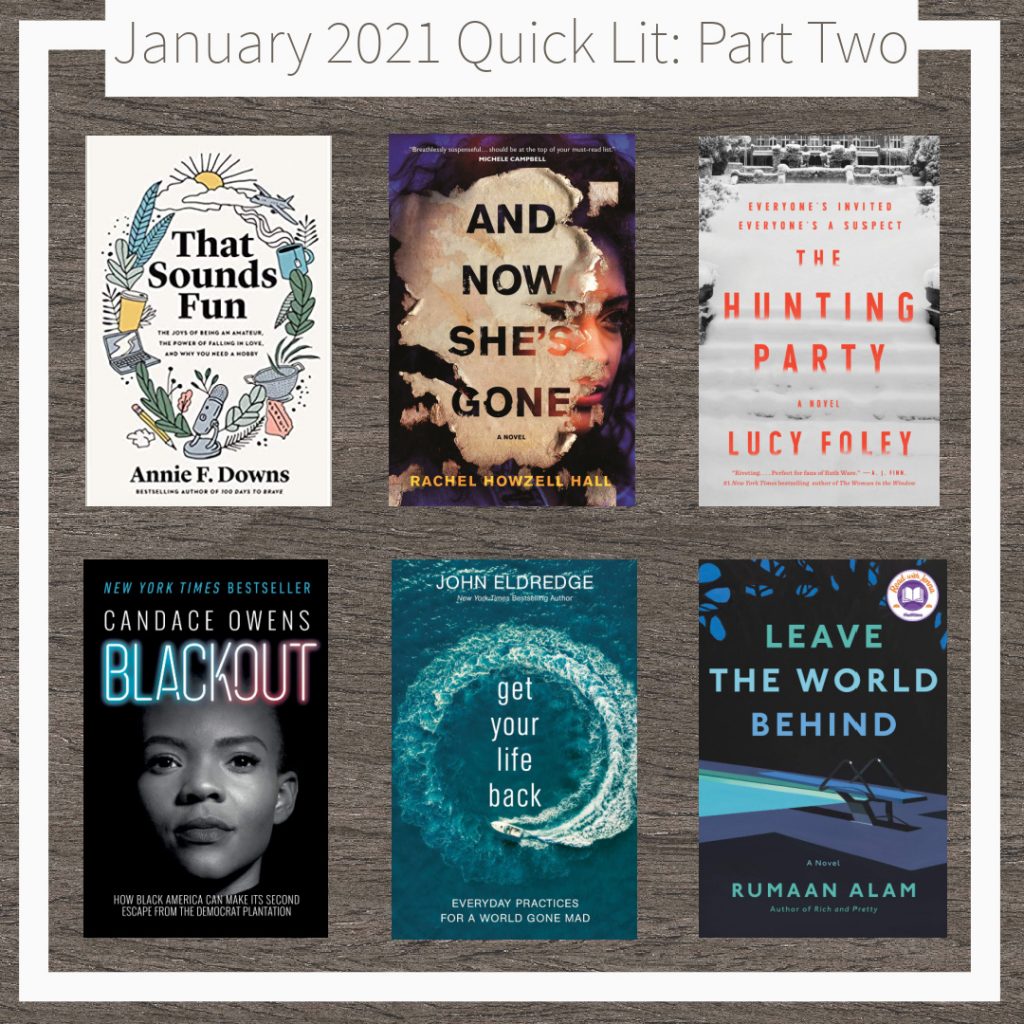
Leave the World Behind, by Rumaan Alam: Amanda and Clay are eager to leave the chaos of their lives in Brooklyn for a week of rest and relaxation with their two teenage children at a rural vacation spot. Their getaway takes a surprising turn when two strangers show up at the door, claiming to be the owners of their luxurious rental home. Ruth and G. H. are an older black couple who have arrived at their home in a panic, claiming a massive blackout in New York city that forced them to flee to the solace and safety of their isolated house. Without internet access and an ability to check the couple’s story, Amanda and Clay are unsure if they can trust these two strangers and their tales of disaster and doom, and the distrust is mutual. But a series of unsettling events leaves the incongruous families with little choice but to bind together for whatever may lie ahead.
This is a bizarre book that left me wondering what, exactly, I had just read. Is it science fiction? Horror? Suspense? It has elements of each of those genres, delving deeper into horror as the novel progresses. At its core, though, it is an examination of race and class, of human reactions to crisis and tragedy, of parenthood and our connection to those we love (and those we don’t), and the ways we isolate ourselves—intentionally and otherwise—from the world around us.
The reviews of this book are quite polarized, with many hating the ambiguous ending and dense prose. While I would have liked a more clearcut conclusion and didn’t care for some of the vulgar passages, I was immensely impressed by this novel. Alam’s prose has been described as dense and overwrought, but I was intrigued by the challenging vocabulary and third-person stream of conscious narration. The tone is initially formal and guarded, eventually forgoing the niceties and evolving into something more relaxed and accessible as the story diverges from pleasant to nightmarish; I was fascinated by Alam’s ability to encapsulate such disparate atmospheres into a rather short novel. Alam’s insights into humanity—particularly the experience of parenting teens—are profound, and his characters are at once loathsome and cringingly relatable.
This book is unsettling, but also unforgettable. It won’t be for everyone, but it’s a must read for fans of insightful literary fiction who are willing accept some ambiguity and suspension of disbelief in exchange for phenomenal, thought-provoking writing.
My Rating: 4 Stars.
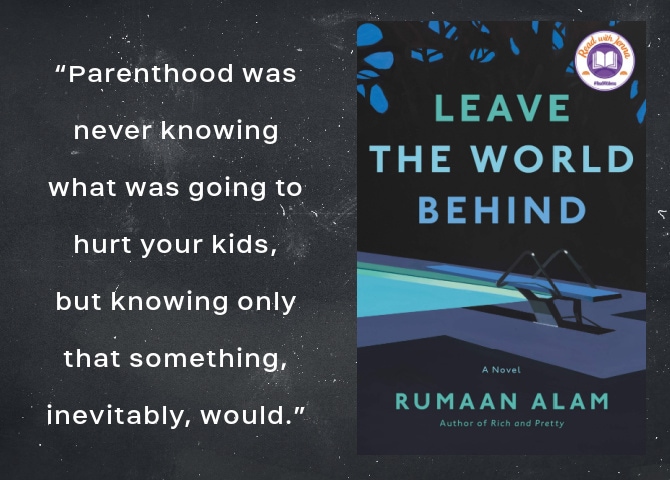
That Sounds Fun: The Joys of Being an Amateur, the Power of Falling in Love, and Why You Need a Hobby, by Annie F. Downs: I adore Annie F. Downs as a teacher, podcaster, writer, and all-around inspiration, and I was thrilled by the chance to listen to her audiobook (a pre-order bonus) before the book’s official February release. Like her other books, That Sounds Fun features short chapters consisting of anecdotes and observations from Annie’s life accompanied by relatable takeaways, insights, and applications. Annie is known for her enthusiasm, optimism, zest for life, and cheerleading of all-things-fun (hence the title of her podcast!), and in this book Annie makes a case for fun as a pivotal component of a fulfilled, joyful life. Annie shows us how she has chased fun in her life, and invites readers to do the same.
While this book is lighthearted and indisputably FUN, it also digs beneath the surface, exposing some of the harder parts of Annie’s life including deep pain, disappointment, and insecurity. With candor and refreshing vulnerability, Annie lets us in on the ways life has been complicated and frustrating and how this has impacted her faith. I don’t know that I could pick a favorite story, but her thoughts on body image and the way God speaks to us through our physicality were particularly relatable.
As always, I was inspired by Annie’s reflection, her ability to glean important lessons from life’s triumphs AND tragedies, and her commitment to emotional and spiritual growth—for herself and her readers. Annie is a captivating storyteller, and I enjoyed hearing her enthusiasm and occasional tears as she read her words aloud for the audiobook. I also loved the audiobook’s three bonus interviews featuring conversations with people who make appearances in the book.
As an Annie F. Fangirl (though I’d like to think Annie would just call us friends), I was familiar with many of this book’s stories, but not all of their takeaways, and I enjoyed getting an even more intimate look at the life of someone I admire so much. I don’t know that this book will be quite so beloved by those who aren’t already part of Annie’s BFF circle, but personally I couldn’t have loved this book more. I am so thankful to Annie for always inviting us along on her own faith journey, which invariably leads us closer to the message of the Gospel and the (fun-loving and deeply kind) heart of God.
My Rating: 5 Stars!
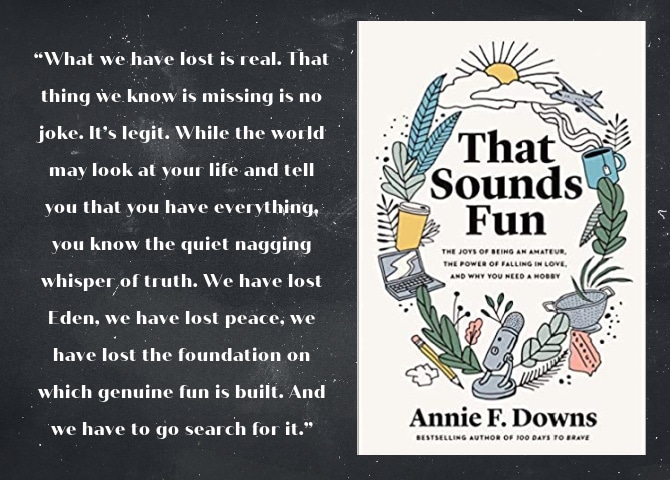
Get Your Life Back: Everyday Practices for a World Gone Mad, by John Eldredge: This past year revealed the brokenness in our world, and for many of us, this brokenness is mirrored in our souls. We are moving at a frenzied pace: even when the world “shut down,” technology and media kept humming away, taking us along for the ride. Our hearts and minds and souls are overloaded and overwhelmed, and these burdens have hindered our lives and—more frighteningly—our communion with God. In Get Your Life Back, John Eldredge gives us the tools to do just that. The book is filled with restorative practices that help disentangle our souls from this broken world and restore a sense of discovery, beauty, peace, and oneness with the Lord.
This is the book I was longing for when I picked up Rebekah Lyon’s Rhythms of Renewal just a few weeks prior to reading this one; that title didn’t live up to my expectations, but John Eldredge came through with this meaningful and actionable guide. Eldredge’s explanations for why our souls have become wounded really resonated with me, and I appreciated his outside-the-box suggestions that borrow from both sacred and secular practices to bring about restoration and healing. I especially loved the ideas for awakening to beauty and tapping into the gifts of memory and of belief—practices that tie in perfectly with my theme of Wonder in 2021.
Get Your Life Back is told from the trenches of Eldredge’s own life: it’s reassuring to know that even a faith leader like John Eldridge struggles with technology addiction, overwhelm, and a sense of feeling distant from God, and I was grateful for his personal stories of implementing his own suggested practices. Eldredge’s writing is poetic and loaded with imagery, making the reading of the book itself a restful and restorative experience. Part of me wishes I had read this in print or ebook so that I could take notes more easily while reading; however, I really enjoyed listening to Eldredge’s soothing voice read the audio, and I had some great takeaways from the bonus audio content included at the end of many chapters.
I came away from this book feeling hopeful about the potential for healing within my own soul—something I have already begun to experience since starting to build these practices and habits into my own routines.
My Rating: 5 Stars!
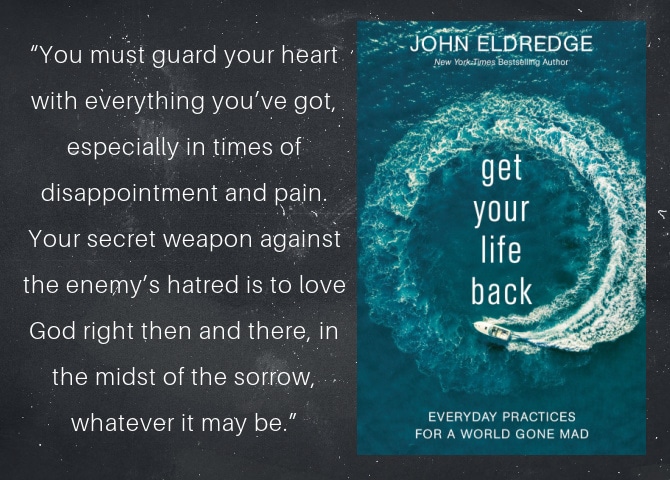
The Hunting Party, by Lucy Foley: In the days after Christmas, a group of old friends gather together at an isolated estate in the Scottish Highlands. They are there to ring in the New Year, a tradition they began ten years ago during their time as students at Oxford. Despite conflicting egos and old grievances that are bubbling to the surface, the trip is going well until one of the guests goes missing and is soon found dead. We know from the start that a fatality will take place, but the victim—as well as the culprit—remains hidden until the end.
I listened to this audiobook immediately after finishing Ruth Ware’s One By One and found the similarities startling. Both books feature a remote setting, a collection of unlikeable characters, rotating (unreliable) narrators, and a bevy of complicated backstories. Despite the parallels, I somehow still felt like I was reading a very different book, and enjoyed this quite a bit. The pacing is superb, and the mystery unfolds in a satisfying yet unpredictable manner. If you’re looking for a wintery whodunit that’s suspenseful but not spooky or gruesome, you’ll love this. It’s not quite as good as Foley’s more recent book, but still quite an engaging read.
My Rating: 4 Stars.
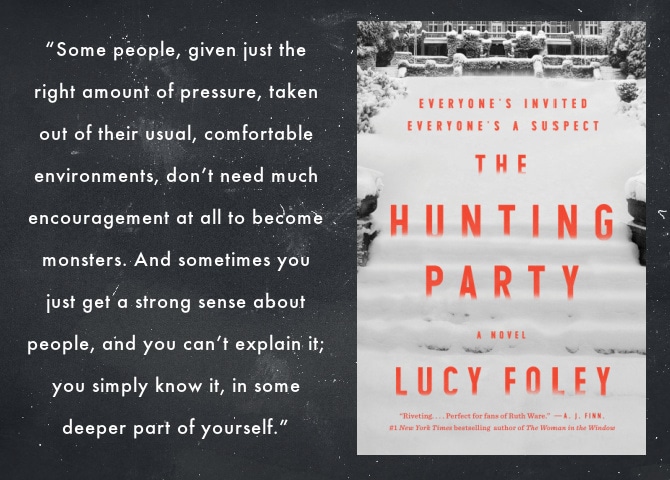
And Now She’s Gone, by Rachel Howzell Hall: Grayson Sykes is a newly minted Private Investigator whose very first case has her searching for Isabel Lincoln—a woman who is most certainly gone, but might not actually be missing. Grayson is reluctant to track down a woman who would rather remain unfound, especially because Grayson herself is a woman of many secrets she would rather keep buried. The narrative alternates between Grayson’s present-day investigation and the past abusive relationship between Natalie Dixon and her malicious husband Sean. As we get to know the women at the center of the novel, we encounter one jaw-dropping moment after another in a story that explores the fluidity of truth, the deadly power of secrets, and the risks a person will take in order to survive.
This book caught me off guard (in a good way): I began the novel expecting a predictable thriller, but was presented with something considerably more complex than your typical detective story. In addition to the twists and turns I’ve come to expect (and desire) from my mysteries, And Now She’s Gone offers a thought-provoking and multidimensional exploration of domestic abuse and trauma. I was grateful for Hall’s willingness to forgo expected (politically correct) tropes in favor of more nuanced perspectives, and I was particularly impressed with the character of Grayson, who is believably flawed yet easy to root for and admire. The literary prose—with its strong imagery and creative metaphors—is also superb.
My Rating: 4 Stars.
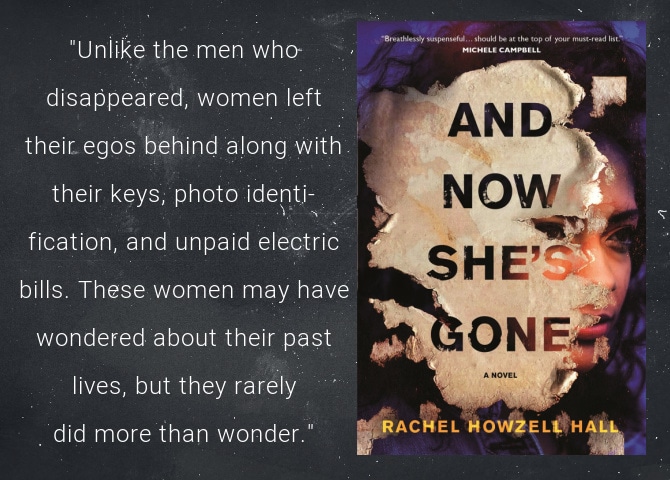
Blackout: How Black America Can Make Its Second Escape from the Democrat Plantation, by Candace Owens: I’ve read quite a few books by black authors this past year in my ongoing quest to learn more about racism in America. My reading has grown repetitive, with many of the books offering only slightly different takes on similar themes of white supremacy, systemic racism, police brutality, and the necessity of reparations. Candace Owens is not one to go along with a crowd, so it’s no surprise that her book does not follow the typical narrative being presented by media and most other antiracism books.
Like many black Americans, Candace Owens was a staunch Democrat for much of her life. As she got older, she increasingly began to question the Left’s motives and policies toward black Americans, which seemed to be exacerbating rather than solving the problems of poverty, violence, and systemic oppression within the black community. In Blackout, Owens examines the Democratic party’s policies and other movements (such as #MeToo, affirmative action, and moves to defund the police) that devalue black lives, dismiss the faith of black Christians, undermine the integrity of black men, dismantle black families, and perpetuate lower academic and economic achievement for black individuals. Owens shares stories from her own life, bolstered by statistics, historical anecdotes, and cultural observations that expose lies of the left that have deceived Americans for too long.
This is a powerful book that runs contrary to the loudest and most prominent voices currently advocating for Black Lives. While I recognize that Candace Owens does not speak for all black Americans, I value her refreshing perspective and willingness to speak truth into harmful cultural and political narratives. Owens is not at all dismissive of racism or of problems facing the black community in present-day America, but she refuses to accept Leftist ideology that claims to have the answers. Her discussions of feminism, black culture, welfare, and slavery were particularly enlightening, and the chapter on over-civilization was extremely eye-opening and convicting.
Owens is aggressive in her views and her presentation, but I admire her nonconformist perspectives, her intelligence and insight, and her refusal to buy into socialism, handouts, or a victim mentality. This book helped me to better understand why and how well-intentioned policies and practices have been subverted by politics and media, and it provided me with the facts and ideological understanding to help bring about genuine racial reconciliation without conceding to unhelpful progressive “solutions.” I could have done without the outpouring of love for President Trump (for the record, I feel this way about singing the praises—or decrying the shortcomings—of ANY single individual, as it gives too much credit and authority to people while ignoring policies [and it tends to date a book]), but I commend Owens for standing by such an unpopular candidate despite the criticism her stance has incurred.
Whether you are conservative or liberal, black or white—if racism, politics, or the wellbeing of Americans are issues that you are passionate about, you MUST read this book.
My Rating: 4.5 Stars. (Rounded down to 4 stars on Goodreads.)

In case you missed Part One of this month’s book reviews, you can find them right here.
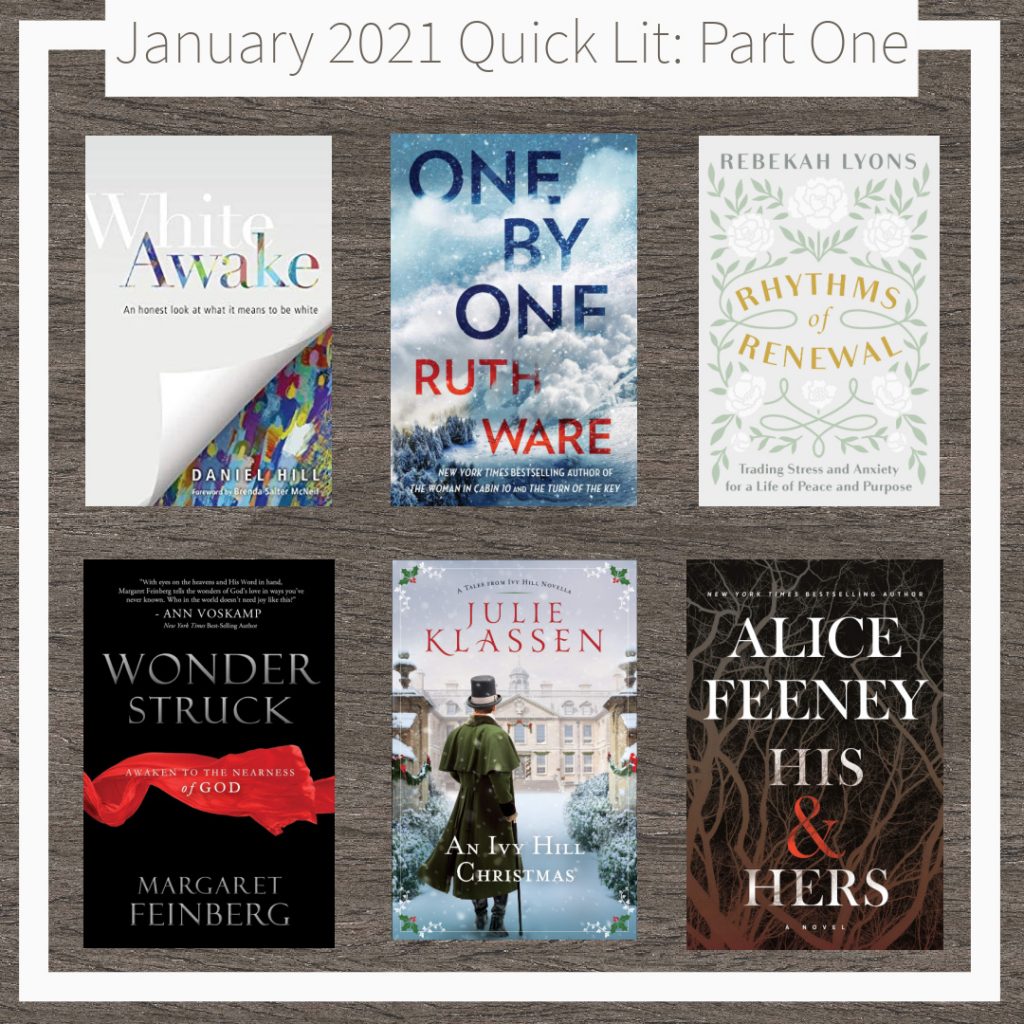
What have you been reading in the first few weeks of 2021? I’d love to hear all about your latest reading successes (and failures!).
Leave the World Behind is on my shelf. I gave it to my BFF for Christmas so that we can read and discuss it together.
It would be a GREAT Buddy read! I wish I’d had someone to discuss it with while I read.
The last John Elredge book I read was A Sacred Romance, which had a tremendous impact on my life. I’ve actually reviewed another Lucy Foley on my blog today — one I think I liked even better than The Hunting Party.
I haven’t read A Sacred Romance, but I haven’t loved several of Eldredge’s other books so I almost didn’t read this one. Now I’m so glad that I did, and I am reading his Restoration Year as my 2021 devotion as well.
I liked Hunting Party but I LOVED The Guest List, it was my favorite mystery of 2020!
Wow! Look at all the stars! 🙌